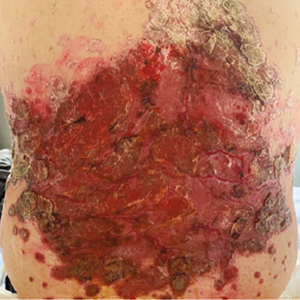Guselkumab for the treatment of severe plaque psoriasis in a schizophrenia patient

All claims expressed in this article are solely those of the authors and do not necessarily represent those of their affiliated organizations, or those of the publisher, the editors and the reviewers. Any product that may be evaluated in this article or claim that may be made by its manufacturer is not guaranteed or endorsed by the publisher.
Authors
A wide range of comorbid conditions are associated with psoriasis, many studies have drawn attention to a higher prevalence of psychiatric comorbidities in psoriatic population. Herein, we present a case of a Caucasian 44-years-old man suffering from a severe schizophrenia, who received guselkumab (a human monoclonal antibody targeting the p40 subunit of IL-23) for the treatment of a moderate-to-severe plaque type psoriasis. After 3 months, the patient reached complete resolution of psoriasis without any side effects, maintained at 6 months follow up visit. Some studies have highlighted the hypothesis that an hyperactivation of immune response appears to be one of the main mechanisms underlying the increased risk of this association. In particular, the axis il-17/il-23 plays a central role in the pathogenesis of this disease. Further research will be needed to assess whether anti-IL23 drugs could be a more suitable therapeutic option in psoriatic patients with schizophrenia.
How to Cite

This work is licensed under a Creative Commons Attribution-NonCommercial 4.0 International License.








